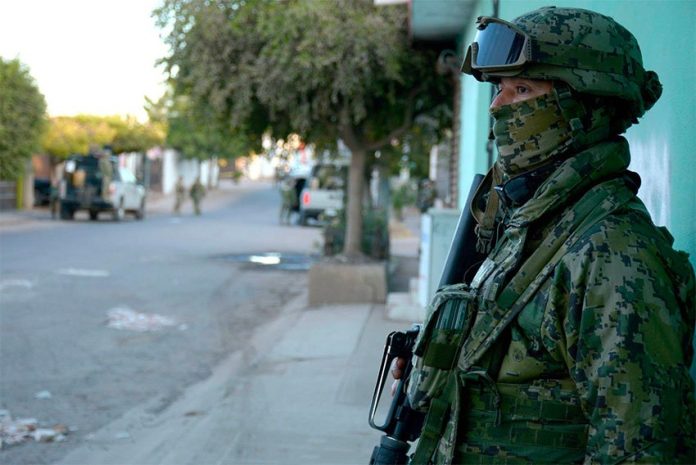A 50,000-strong national guard is one of the central elements of a new national security plan presented yesterday by president-elect López Obrador, who pledged that his government’s priority will be to guarantee peace and improve the lives of Mexicans.
The new guard, which will be under the control of the army, will be made up initially of members of the army, navy and military police, and is expected to be operational within three years.
Alfonso Durazo, the new secretary of public security, pledged a radically different approach to the “repressive strategy” that has been in force since 2006 when former president Felipe Calderón deployed the military to wage a war on drugs.
The strategy, continued by the current administration, has been a “manifest failure,” Durazo said.
“Despite the hundreds of thousands of lives lost, the billions of dollars invested, the military resources used and the intelligence and surveillance used in the war on drugs, the Mexican government has not been able to defeat the cartels and there’s no prospect of it doing so any time soon,” he charged.
However, Durazo also said that it would be disastrous to withdraw the military from its public security role.
Shortly after López Obrador’s landslide victory in the July 1 election, the future security secretary said the incoming government would gradually withdraw the military from the nation’s streets.
But both he and López Obrador have since backtracked on the idea.
Yesterday he noted that there has been a “decomposition” of police forces at all levels.
While the use of the military will continue to be a major part of the new government’s security plan, López Obrador said that 80% of his government’s overall security strategy would try to address the root causes of crime.
The task is enormous. Last year was Mexico’s most violent year on record, with 31,174 homicides, according to the National Statistics Institute. There is a good chance that this year will finish with an even higher murder rate.
The new security strategy is built on eight key components:
1. The eradication of corruption and a renewed pursuit of justice.
Political impunity for lawmakers, known as the fuero, will be eliminated and government purchases will be monitored in real time. All government officials will be required to declare their assets and make their tax records available.
The new government will seek to classify corruption as a serious crime. It will also go after the finances of organized crime and aim to reduce money laundering.
2. Guaranteed employment, education and health care.
Through development and well-being programs, the new government will aim to reduce poverty and marginalization.
3. Guaranteed respect for and promotion of human rights.
The incoming government will not permit repression or torture and pledges to investigate all reports of human rights violations.
The release of political prisoners who didn’t commit any act of violence will also be pursued.
4. The regeneration of societal ethics.
Through the creation of a moral constitution, the new government will seek to improve relationships at the individual and collective level.
It also pledges to be austere, honest, inclusive and respectful of individual freedoms.
5. Reformulation of the war against drugs.
Government funding dedicated to fighting cartels and other criminal gangs will be redirected to drug rehabilitation services and programs.
“You can’t confront violence with violence. You can’t fight fire with fire and evil with evil,” López Obrador said.
6. Peacebuilding
The López Obrador-led government will seek to build peace by guaranteeing victims’ rights based on four components of transitional justice: truth, justice, reparations for damages and a guarantee that crimes won’t be repeated.
It will also introduce legislation that could reduce prison terms for criminals or grant amnesty.
7. Recovery of the control of prisons and improvement of their conditions.
Criminals who have been convicted and sentenced to prison terms will be held separately from inmates who have been ordered to remain in preventative custody.
Improving conditions in women’s prisons will also be a priority.
8. The new security plan
Working with public institutions and Mexican citizens, the incoming government aims to develop a culture of peace. The new national guard will both prevent and fight crime as well as preserve security.
The new plan was not warmly received by longtime security analyst Alejandro Hope, who wrote yesterday that it gave him little peace of mind and few reasons for optimism.
Hope wrote in an opinion piece in the newspaper El Universal that “there is a lot of willfulness and magical thought behind the plan,” pointing out there is not much empirical evidence that shows that combating corruption will lead to a reduction in crime.
He also said it appears the new government intends to offer legal benefits to serious criminals, a proposal that goes well beyond the amnesty for small-time criminals previously put forward
In addition, Hope noted that little was proposed in the way of police reform.
However, Durazo yesterday gave the strongest of endorsements to the government’s approach, declaring “this plan will bring peace to every corner of the country . . . Children will be able to play in the streets again.”
The plan takes effect on December 1 when López Obrador is sworn in.
Source: El Financiero (sp), El Universal (sp), Financial Times (en)
